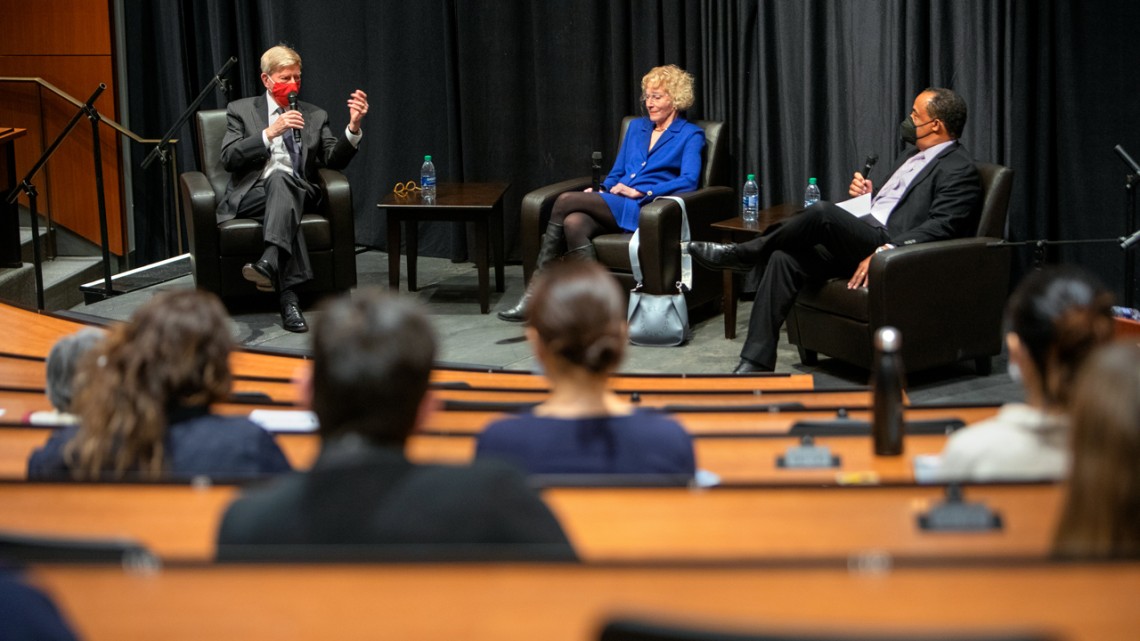
Panelists at the Oct. 28 Coors Forum were, left to right, George Will, columnist for The Washington Post; Martha Nussbaum, the Ernst Freund Distinguished Service Professor of Philosophy at the University of Chicago; and Michael Huyghue, visiting professor of the practice at Cornell Law School.
Panelists: Coach salaries foster corruption in college sports
By Sherrie Negrea
The exorbitant salaries of top coaches in the division are the primary reason that corruption has become endemic in college football, according to panelists at an Oct. 28 forum exploring sexual assault and academic corruption in Division I college athletics, part of the 2021 Peter ’69 and Marilyn ’69 Coors Conversation Series.
The highest-paid football coach in Division I athletics is Nick Saban of the University of Alabama, who earned $9.3 million last year, according to USA Today.
The money to retain football coaches and recruit athletes leads universities to make “devils’ bargains” with investment groups that are often apparel companies, turning them into power brokers on college campuses, Martha Nussbaum, the Ernst Freund Distinguished Service Professor of Philosophy at the University of Chicago, said at the event, held in Myron Taylor Hall, Cornell Law School.
“With all this money both going in and, they hope, through TV revenues coming out, there’s a horrible collective action problem,” she said. “Because if they uphold high standards – academic standards and standards of sexual conduct – then they’re going to lose out on some of the recruits that they wanted. So gradually there’s a race to the bottom and they insulate the athletes who commit sexual assault from full accountability.”
Nussbaum, author of “Citadels of Pride: Sexual Abuse, Accountability, and Reconciliation,” spoke on the panel with George Will, the Washington Post columnist who has written three books about baseball. The event was moderated by Michael Huyghue, visiting professor of the practice at Cornell Law School, who specializes in sports law.
The Coors series, which launched in 2019, brings together speakers with diverse political viewpoints and provides the Ithaca campus community with a forum for intellectual discourse on difficulty but timely issues.
High-stakes college football produces academic shortcuts that allow athletes to spend more than the 20 hours a week they’re supposed to be devoting to their sport, based on NCAA rules, Will said. This academic corruption leads college athletes at many universities to take courses he called “academically laughable.”
While sports can cultivate exemplary traits for men and women, such as agility of mind and agility of body, Nussbaum said that is not the case with college football. “I think what happens with college football is that they don’t emphasize those virtues, to put it mildly,” she said. “They emphasize just sheer force.”
The panelists disagreed on whether sexual assault cases on campus should be prosecuted by a special university tribunal or the criminal justice system. Since sexual assault is a felony, Will said cases should be prosecuted by professionals, not panels of college professors and administrators.
“No college should be in the business of running a parallel criminal justice system,” he said.
Nussbaum, however, argued that it can take years for cases to proceed through the criminal justice system and both parties will have graduated by the time they are adjudicated. “There’s a need to intervene, right now, because it contaminates the climate of instruction,” she said.
College athletics will only be reformed when the recruitment process is changed and coaches no longer have the power to get preferred high school athletes admitted, Nussbaum said.
“If they can get people in because they say so, then the corruption begins there,” she said, “and so the first thing I would say is, you’ve got to clean up the admissions.”
Sherri Negrea is a freelance writer for Cornell Law School.
Get Cornell news delivered right to your inbox.
Subscribe
